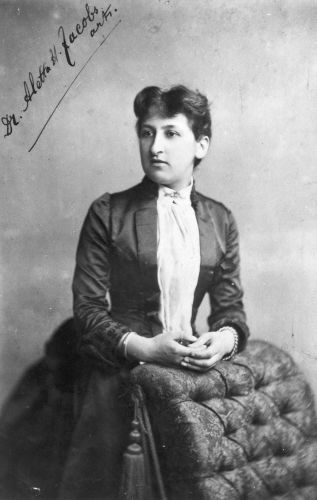Wereld Vrouwendag valt samen met promotie dr. Aletta Jacobs
Acht maart is het niet alleen Wereld Vrouwendag, maar ook de dag waarop Aletta Jacobs (1854-1929) in 1879 promoveerde. Dit maakt het de perfecte dag om dr. Jacobs en haar successen dubbel te vieren.

Aletta Jacobs wist op haar zesde al dat ze, net als haar vader Abraham en broer Julius, dokter wilde worden. Zo schreef ze in haar autobiografie: ‘Uren achtereen kon ik doodstil zitten luisteren naar hunne gesprekken, die meestal liepen over interessante ziektegevallen in het Groninger hospitaal of over belangwekkende dingen uit vader’s praktijk. Natuurlijk begreep ik niet de helft van ’t geen door het tweetal werd behandeld. Toch boeide mij het onderhoud zoo, dat ik er mijn makkertjes, mijn speelgoed zelfs voor in den steek liet.’
Ze had dit doel dus al vroeg voor ogen en heeft ook nooit getwijfeld aan de haalbaarheid ervan, ook al was studeren tot dan toe enkel weggelegd voor mannen. Dit vertrouwen schreef ze toe aan haar ouders, die al hun kinderen altijd gelijk behandelden en evenveel kansen gaven. Haar weg naar het dokterschap bleek toch lang en lastig. Desondanks heeft Jacobs alle obstakels overwonnen en haar arts-diploma in ontvangst mogen nemen in 1878. Hiermee was ze de eerste vrouw in Nederland die een universitaire studie succesvol afrondde.
Jacobs was alleen nog niet klaar met studeren: ze wilde graag een doctorstitel behalen. Uiteindelijk besloot ze om haar proefschrift te schrijven ‘over localisatie van physiologische en pathologische verschijnselen in de groote hersenen.’ Ze had eigenlijk liever een ander onderwerp gehad, een onderwerp waar ze later in haar carrière waarschijnlijk nog wat aan zou hebben: ze wist dat ze zich als dokter niet wilde bezighouden met de hersenen. Toch koos ze, door ‘gebrek aan materiaal en (…) de noodige leiding’, voor dit onderwerp.
Jacobs keerde terug naar haar ouderlijk huis in Sappemeer om daar aan haar proefschrift te werken. Dit proces werd echter verstoord in de zomer van 1878, toen Abraham getroffen werd door een beroerte. Hierdoor raakte hij deels verlamd en blind aan één oog. Om haar ouders te helpen nam Jacobs waar in de praktijk van haar vader. Het schrijven van haar proefschrift kwam op een laag pitje te staan en ze twijfelde zelfs of het nog zin had om te promoveren; ze was immers al aan het werk als dokter.
Ze legde haar twijfels voor aan vrienden, die niets wilden weten van Jacobs’ plattelandspraktijkplan: ze drongen eropaan dat hun vriendin zou promoveren en daarna terug zou keren naar Amsterdam, om daar als dokter aan de slag te gaan. Ze kreeg zelfs van een kennis van haar professor duizend gulden om mee op reis te gaan na haar promotie.
Aletta Jacobs stortte zich weer volledig op haar proefschrift en promoveerde op 8 maart 1879, ten overstaande van een groot publiek. Hiermee was ze de eerste Nederlandse vrouw die een doctorstitel behaalde.
